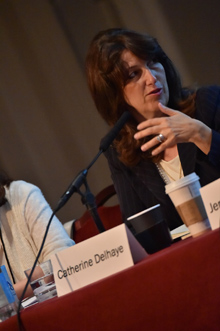International laws complicate the hunt for data evidence

Image from Shutterstock.
The ubiquity of information, coupled with conflicting international laws about privacy, data protection and national security laws, is making litigation a minefield of challenges, attorneys agreed at a panel discussion at the ABA London Sessions Friday.
In simpler times, the question of where evidence was located usually was a straightforward one to answer: on paper, probably in a file somewhere. But that is no longer the case, said Katie Woodcock, associate general counsel for privacy and security for Nike Inc. in Hilversum, Netherlands.
“Now, information is everywhere,” Woodcock said. “There’s data on our telephones, on the cloud, and in all sorts of other places you don’t expect it to be.”

Charles Hollander of Brick Court Chambers, London. Photo by Simon Apps.
The problem can be illustrated by Microsoft’s current refusal to produce data held on servers in Ireland that the U.S. government has demanded, said Jeremy Feigelson, partner at Debevoise & Plimpton in New York. Microsoft said the demand violates international laws and has refused to produce the information. Several leading technology and media companies, including Apple and ABC, have filed amicus briefs in support of Microsoft. The case currently is in the U.S. Court of Appeals, Second Circuit.
Microsoft’s refusal to produce evidence that is in Ireland is driven in part by public perception of privacy after Edward Snowden, the former National Security Agency employee who exposed the mass surveillance program run by the NSA, Feigelson said.
“It arises in a post-Snowden context where there is tremendous heightened skepticisms in Europe about what is America up to,” Feigelson said. “U.S.-based businesses are feeling a commercial need to show their privacy chops in a more public way to the European market.”
Attorneys also need to become savvier about all types of technology, especially social media, said Charles Hollander of Brick Court Chambers, London. “Fifteen years ago, I would tell companies that they need to have one or two people who know computers,” he said. “Now I tell them they need a teenager.”

Catherine Delhaye of Valeo in Paris. Photo by Simon Apps.
The legal issues become even more complex when international companies need to comply with the competing laws of different nations, said Catherine Delhaye, chief ethics and compliance officer at Valeo in Paris.
For example, in Europe, privacy is considered a fundamental right, with any personal data that can be connected to a person has to be protected, she said. Companies need to be aware of what data they can access on the professional devices provided to employees, and that can differ from country to country. She suggested that international companies draw up an information technology charter, or IT charter, for all employees to sign that makes clear how the device can be used, but the consent laws will differ from country to country.
“It’s very complex,” Delhaye said. “You have to think it through way before you’re in trouble.”
The ABA London Sessions panel discussion, “Where in the World is Your Evidence? The Challenges of Gathering Electronic Information Worldwide for Litigation, Arbitration and Investigations” explored the challenges of obtaining evidence on a global scale and how best to navigate the competing laws and expectations. It was sponsored by the ABA Section of International Law. The ABA London Sessions are being held to commemorate the 800th anniversary of the signing of the Magna Carta and will run through Monday.
• See what people are saying about the events on Twitter at #MagnaCarta800th and #ABALondon2015, and follow along with our full coverage of the ABA London Sessions.



